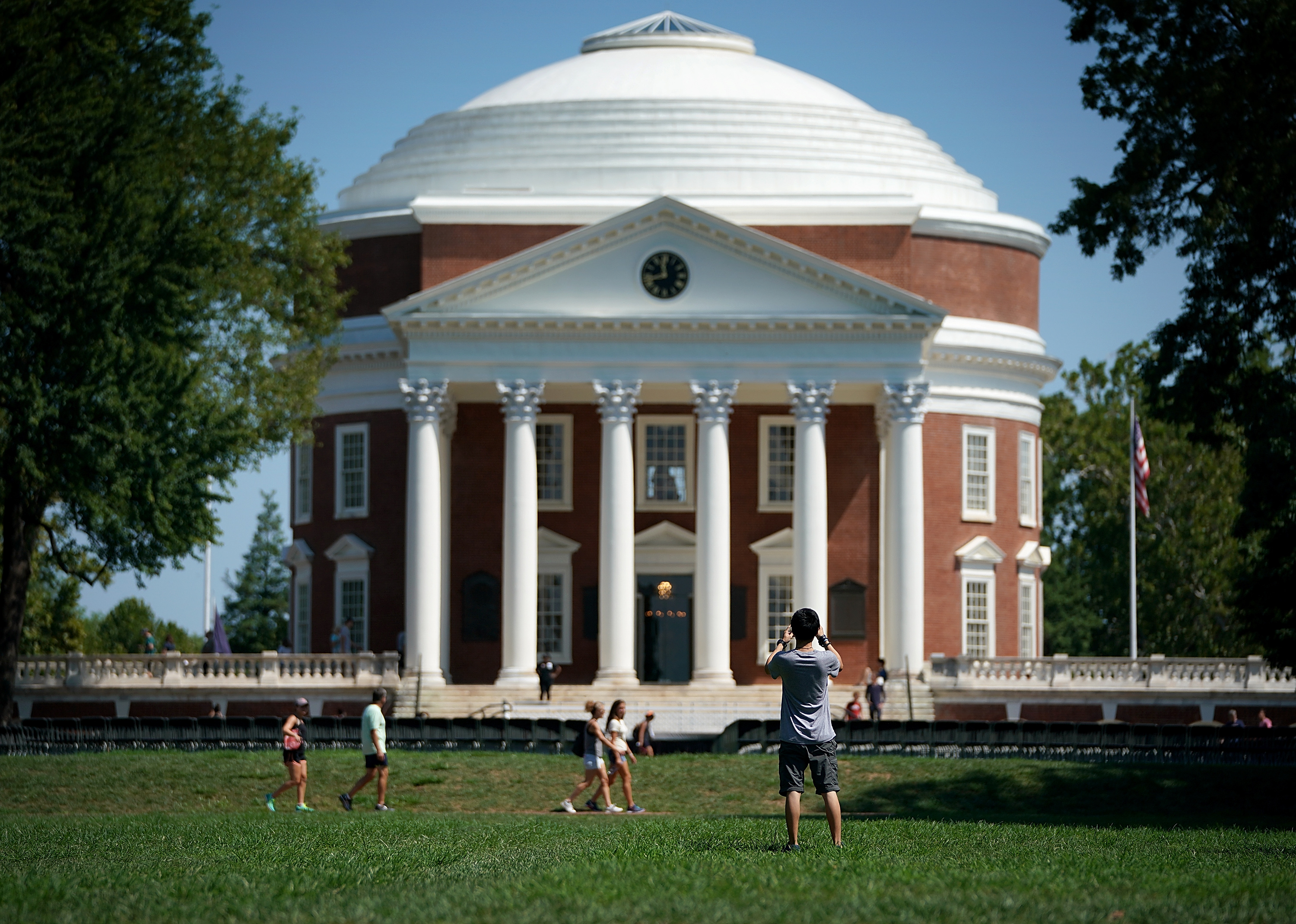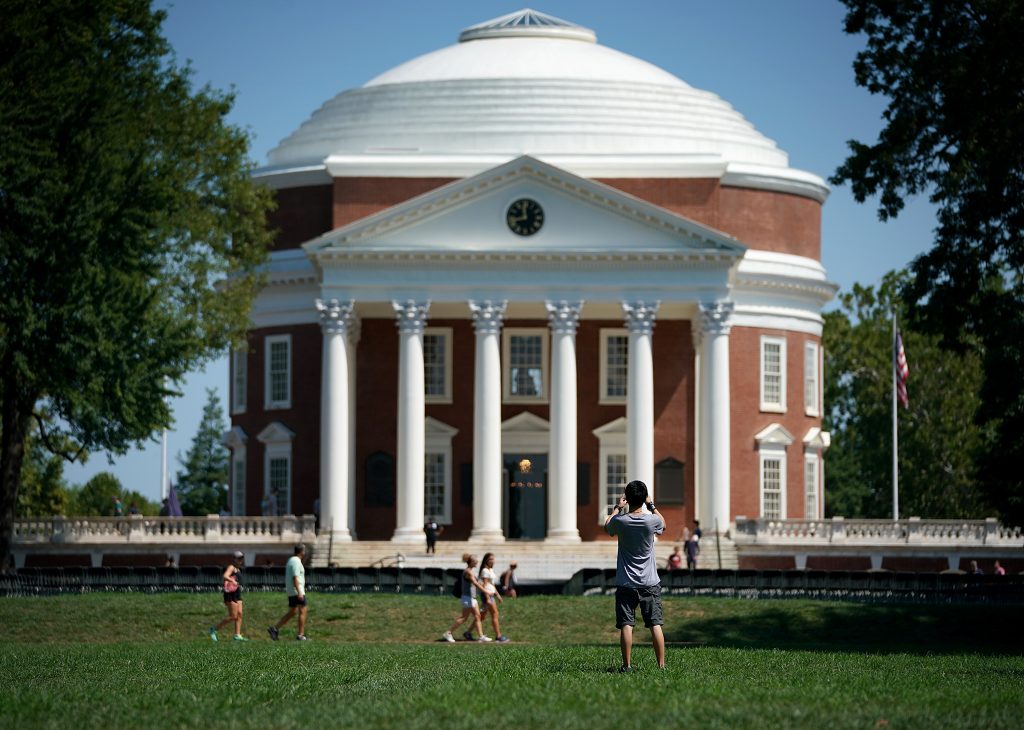College campuses across the country are filling up with a new freshman class, students who are thrilled to take on the next chapter of their lives, make new friends, learn about topics that interest them, start internships and explore the new city they’ll call home for the next four years. At the University of Virginia (UVA), Friday marked the start of move-in weekend, and along with excitement will likely come fear, anxiety and confusion for incoming students – especially those of color.
Just one week ago, hundreds of white supremacists marched on their campus holding torches and chanting “you will not replace us.” The protesters gathered in dissent of the city of Charlottesville, VA’s plan to remove a statue memorializing the Confederacy’s top general, Robert E. Lee. When the crowd of mostly white men encountered a much smaller group of counter-protesters, they became physically violent, swinging torches and spraying lighter fluid and pepper spray at the anti-racist demonstrators. One counter-protester and two police officers were killed in the riot.
This is the climate that more than 4,000 new freshmen entered last weekend. This is the “safe space” parents will send their teenage children to receive an education. This is the city where young people are supposed to find their freedom. For many, this will be that space. But for some, particularly the black and brown students of the class of 2021, this campus may seem more threatening than secure and more disenfranchising than liberating. But the university is as much their school and home as it is their classmates’, and alumni want to help them navigate campus life in these unnerving times.
Here, Latino UVA alumni share advice to incoming Wahoos.
Chris Gomez Blank, Class of 2009
Incoming Latinx students, find strength in each other. I imagine you, and your parents, are terrified for your safety. I would be, too. While my Latinx friends and I lamented over micro-aggressions each of us experienced throughout our four years at UVA – and there were several – the aggression you will face will be anything but micro. It is entirely possible that there will be another protest like what we saw last weekend. I imagine there will be people in your dorms who are openly sympathetic and supportive of the white supremacists and Nazis we saw terrorizing Charlottesville. People will no doubt come from outside Charlottesville to do a drive-by-shouting at you, and it’s possible you will be called a racial slur. Each of you has to make a decision in the context of your personal safety in the moment to speak up. But there’s one thing you must know: You have earned the right to be at UVA. Do not let anyone take away that feeling of accomplishment you felt when you were accepted. I urge you to find each other. Our community can be divided at times between country of origin, race and class, but at this moment in our country’s and UVA’s history, you need to push those issues aside and support one another. Do not spend one minute deciding who is “Latinx enough.” The people we saw over the weekend do not see any of us as human beings, and we simply do not have time to fight among ourselves. At the end of the day, we are all “Latinx enough” for them to hate us.
Annie Plotkin-Madrigal, Class of 2016
I was on a six-hour flight when the attack took place. Once I stepped off the plane and read texts and headlines about it, I could do nothing but put my head in my hands. I was scared, but unfortunately, not surprised. New Latinx students, who are likely afraid as well, know that your fear is fair. It’s reasonable to be concerned for your safety. How could you not after hearing about what happened? My advice is to engage with that fear, understand it and have it motivate you and where you spend your precious time. Build your network thoughtfully – this includes professors, staff, classmates, community members and people from back home. This group will offer much-needed support for your mental health, which matters. Build friendships and join forces with black students. Our struggles are all linked, and this is a crucial moment where we need big pushes to achieve big goals. The Black Student Alliance at UVA has a history of articulating clear and thoughtful demands. Listen to them. Bring them to the Latinx Student Alliance, if you’re a part of it. We all need to do better at advocating for and with each other.
Eric Ventura, Class of 2010
When I first heard the news of the tragedy in Charlottesville, I was deeply saddened but not entirely surprised given the current political and social climate as well as the history of Charlottesville and the university. These are the conditions in which a new class of students will be entering UVA. I want incoming Latinx students to know that it is our responsibility as citizens, university students and decent human beings to denounce bigotry and injustice. College is a time of excitement and joy, but it is also an awakening and an opportunity to disrupt the institutional conventions that mask deeply rooted bigotry. I urge incoming students to be active in the greater community and build bridges with other groups on campus. I encourage fellow Latinxs to reach out to black student groups and support their organizations, from which our own comparatively new organizations have a lot to learn. I challenge Latinx students to question our own prejudices within our community that weaken our own efforts and undermine those of other advocacy groups around us.
José López-Sánchez, Class of 2009
Hearing about the neo-Nazis marching through Grounds last week was revolting, but sadly it was not wholly surprising. Charlottesville was a wonderful place to live and study, but it was by no means perfect. I experienced overt, explicit racism firsthand and witnessed it in more pervasive and subtle ways over the years. But this is a U.S. problem, not just a Charlottesville one. I want to remind the incoming class of Latinxs that it’s OK to let yourself feel complex feelings. You’re about to experience what should be the happiest and most exciting few months of your life, and you’re arriving in Charlottesville while the entire town is under the microscope. It’s going to be weird and harder for you than many other incoming first years that have preceded you, and that’s not to diminish the very real challenges and tragedies that the student body has experienced and lived through in recent times. You might be really sad and scared. Talk to your parents and friends from home honestly. They might not understand (I hope they do), but it will help you feel better. Don’t be afraid to have difficult conversations and to question authority. Your incoming classmates will be experiencing a lot of the same things – they’re there for you as well. These racists, white supremacists and neo-Nazis hate you and your classmates of color equally. Remember that the deepest friendships are made in the most trying times.
So, make those friends, allies and learn the truth about the history of discrimination in this country. Recognize that it falls on each and every one of us to push back against racism. While it’s easy to take a stance against these openly hateful, ignorant people, it’s important to remember to call bigotry out in the smaller, quiet moments as well. Keep your wits about you and trust your gut about situations and people.
Bernice Ramirez, Class of 2009
What happened in Charlottesville is heartbreaking, but it wasn’t shocking. Racial tension has always existed at the university. I often felt excluded and was even witness to anti-immigrant stereotypes. What helped me was becoming involved. I was the chair of the Minority Rights Coalition and a part of the Latino Student Union. My advice to incoming Latinx students is to find your community. That’s where you’ll find home, where you’ll find people who will build you up. This doesn’t just have to be other Latinx students, either. We have a responsibility, especially those of us with light-skin privilege, to stand with and for our fellow black students, to unite in our fight against racism and for freedom. Be vocal about your support and listen. Be a good ally, and know that allies come in all colors.




